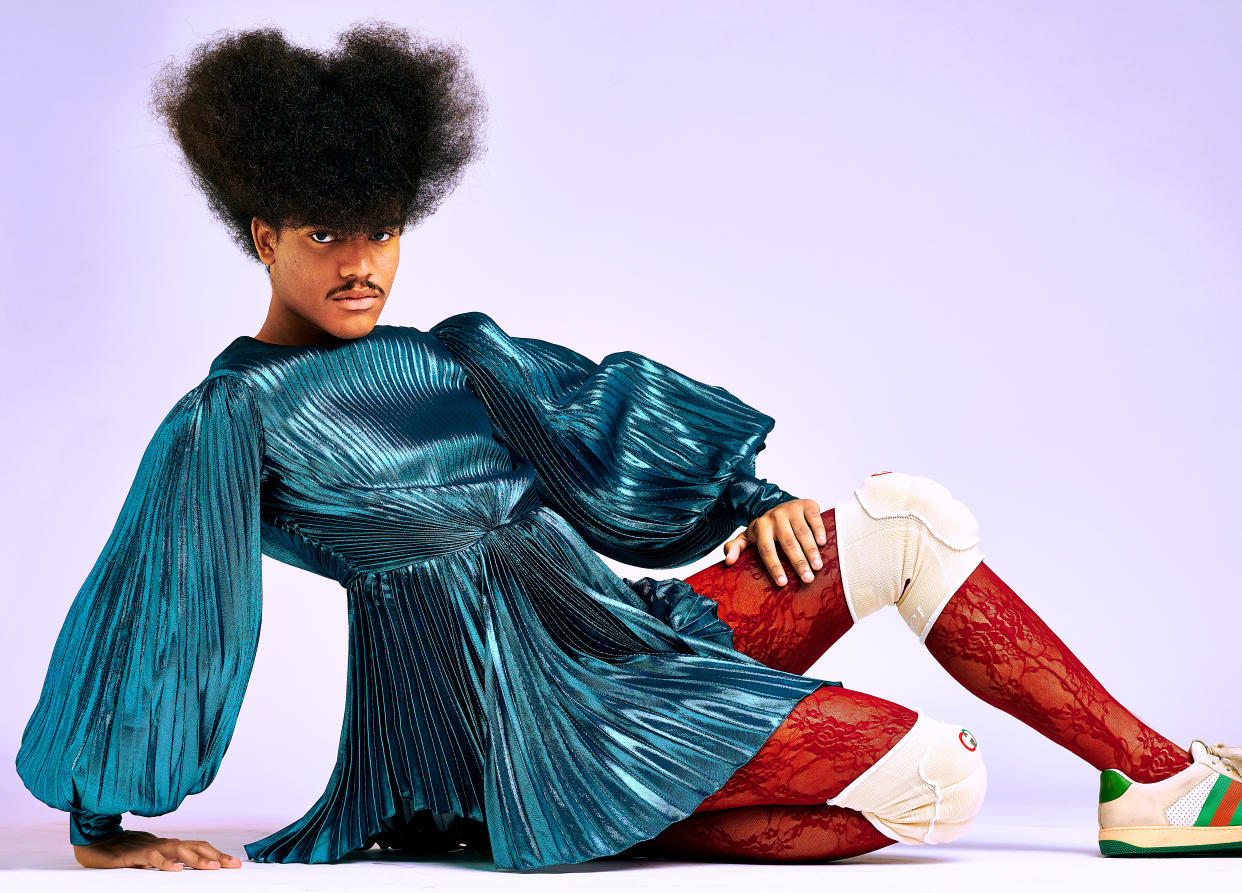SambaZine: Brazil’s LGBTQ+ Photo Manifesto

Click here to read the full article.
Brand-new Brazilian LGBTQ+ magazine SambaZine is about to hit New York, with one of the country’s top young artists Samuel de Saboia on its cover.
Most Manhattanites browsing the shelves of Casa Magazines in the West Village wouldn’t even bat an eyelid at the fact that he is adorned in a black satin halterneck dress by British label Art School.
More from WWD
But in his native Brazil, editor Juliano Corbetta believes the image sends a strong message to the country’s young LGBTQ+ community that they are represented and celebrated at a time when its government’s rhetoric can be viewed as increasingly homophobic and transphobic.
According to Corbetta, everything about de Saboia means he shouldn’t have become successful enough to warrant his own cover in Brazil’s current political climate and that is exactly why he put him front and center.
“Samuel is a 22-year-old artist. He’s black, gay and from the northeast of Brazil, so in theory in a country like Brazil and in our current political scene he’s not supposed to succeed and yet he’s one of the most important names in Brazilian art right now,” Corbetta told WWD over the phone from his São Paulo apartment.
“I think that kid needs to be celebrated and I think someone who’s young should see this kid on the cover of a magazine.”
Having such a forceful social and political message for the biannual publication wasn’t the original intention of Corbetta, but that changed last October when Jair Bolsonaro, a congressman who in a 2011 interview declared he would rather have a dead son than one that was gay, became Brazil’s president.
Since then, campaigners argue that there has been an increase in hostility and threats of violence against the community and even Brazil’s top court moved to criminalize homophobia and transphobia in June amid concerns there could be a rollback on LGBTQ+ rights.
“I feel it’s a responsibility these days, especially with our current government in Brazil. I feel all of us as artists have a responsibility to do more. I don’t think I necessarily felt that up until a year ago after the elections, but now I think it’s almost an obligation to do something like this,” added Corbetta, who also founded the magazine Made in Brazil.
“What I have to say is pretty simple. For a young kid that’s maybe listening to a speech from the government telling him that it’s not OK to be who he or she is, I just want to make sure that they can look at something, dream and aspire and understand that they can be who they are and there are all these people in this book who are living exactly as who they are. It’s a message for people to keep going and also to dream.”
To tell the LGBTQ+ community’s story, SambaZine doesn’t rely on words. Instead, it uses 200 pages of photographs of some of the biggest names in the new Brazilian musical scene, the majority of them queer or promoting a message of diversity and inclusivity, along with young actors and kids cast from Instagram.
“To me, it is a new approach to creating a magazine from a casting and editing perspective, as all stories and photographs are intertwined like an Instagram feed, with no text on any of the images (and only an index on the back of the book to identify all proper photography and fashion credits),” said Corbetta.
“There are almost no models in the book, as I believe there will be a shift in the industry regarding models, and I also believe that artists and kids from Instagram communicate better with a younger audience,” he added.
Not everyone is LGBTQ+, although that was the initial idea. That’s because as Corbetta got pulled deeper into the project, he realized that if the book just featured only gay and trans people, it would be some sort of a box and that’s not his intention. “I want it to be inclusive and open. I wanted to make sure you didn’t know who was gay or not because it doesn’t matter.”
Another interesting element is that it doesn’t include advertisements — only content collaborations with brands such as Armani Exchange, Fiever and Mash that gave the magazine full creative control.
“This is how I envision this project going forward. I want to work with brands that not only want to be able to part of a project that allows creative freedom for stylists and photographers but that also has social responsibility,” said Corbetta.
The social aspect, meanwhile, includes it helping as many as 40 trans people legally change their names this year in São Paulo through its collaboration with Fiever, a sneaker brand from Alexandre Birman’s Arezzo Group.
As for whether it was difficult to persuade people to participate given the political climate, there were several gay artists who turned down the project.
“The reason that I always received on an e-mail was scheduling conflict but I don’t think that was reason. So I think that there are people that are afraid to participate in it and didn’t participate but the ones that did went full force because all of them are already very outspoken on their daily lives and platforms,” he said. “The artists that agreed to participate on this project are very aware of their impact and importance in this conversation so I never sensed that there was fear in any of them.”
Read more here:
Ben Cobb Is Leaving Another Man
Flaunt Magazine Lawsuit by Former Assistant Dismissed
Sign up for WWD's Newsletter. For the latest news, follow us on Twitter, Facebook, and Instagram.

